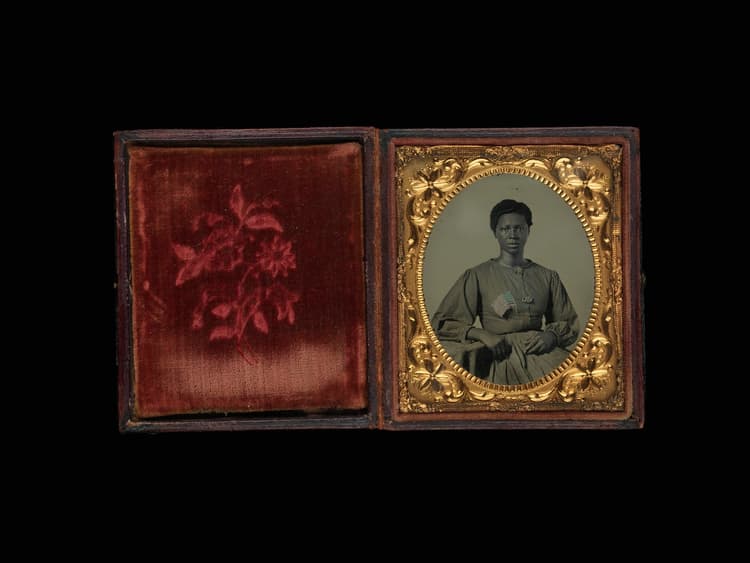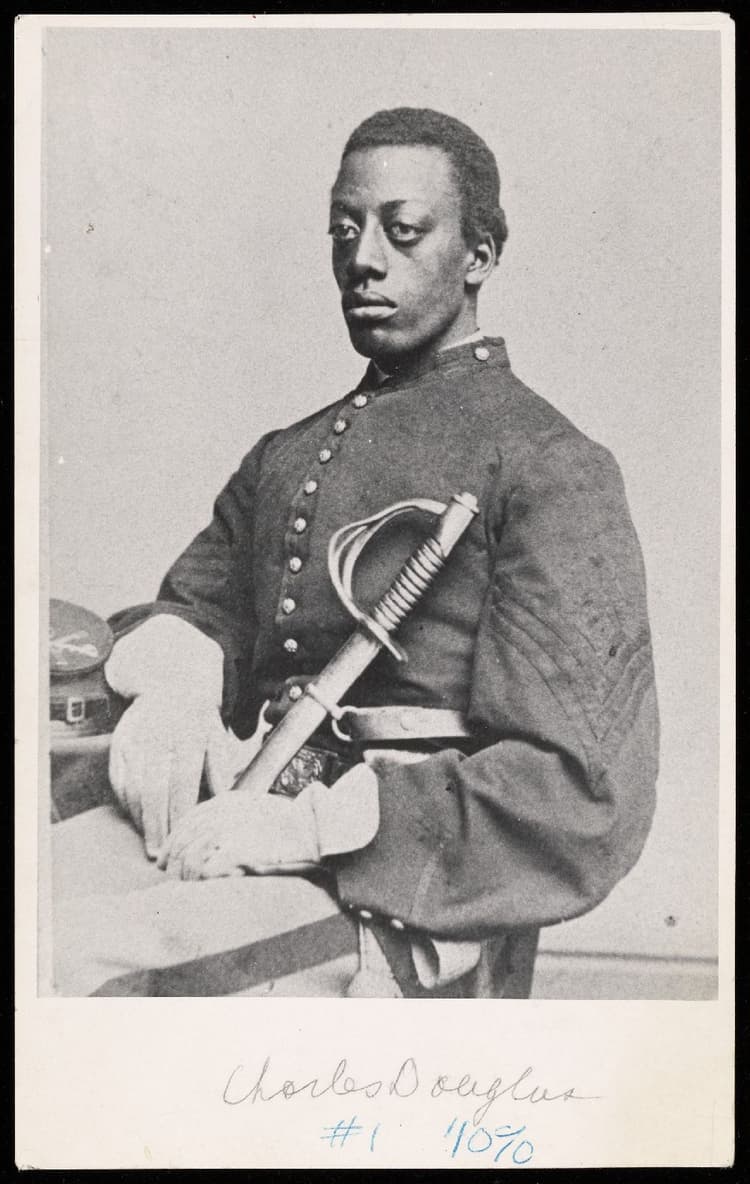The Civil War and Black Communities
Zoe Green
10 min read
Listen to this study note
Study Guide Overview
This study guide covers the Civil War contributions of African Americans, focusing on their motivations (freedom, citizenship), diverse roles (soldiers, support staff), and the inequalities they faced (lower pay, risk of re-enslavement). It also explores the impact of their service, including anti-Black violence and their lasting legacy. Key sources like photographs of Charles Remond Douglass and a washerwoman, and Paul Laurence Dunbar's poem "The Colored Soldiers" are analyzed. Finally, the guide provides practice questions and exam tips.
#AP African American Studies: Civil War Contributions - The Night Before
Hey! Let's get you prepped and ready to ace this exam. We're going to break down the Civil War contributions of African Americans, focusing on what's most important. Let's make this stick! 💪
#1. The Civil War as a Turning Point
- The Civil War was HUGE for African Americans. It wasn't just a war about states; it was a fight for freedom and citizenship. 💡
- Both free and enslaved Black people saw the Union cause as a path to ending slavery and gaining their rights.
- They weren't just bystanders; they were active participants, ready to fight for their future.
The Civil War was a pivotal moment where African Americans actively fought for their own liberation and citizenship.
#2. African American Participation in the War
#2.1 Union War Effort
- Support from All Sides: Free and enslaved individuals from both the North and South rallied to support the Union. They saw a chance to end slavery and secure Black citizenship.
- Risk and Sacrifice: Enslaved people risked everything to escape and join the Union forces. Free Black people in the North raised funds, supported refugees, and established schools and medical assistance in the South.
#2.2 Roles in Military and Support
- Men in Action: Black men served as soldiers on the front lines and as builders constructing crucial infrastructure. 👷🏾♂️
- Women's Vital Roles: Women worked as cooks, nurses, laundresses, and even spies, providing essential support.

Caption: An African American washerwoman for the Union Army in Richmond, VA, 1860s. This image highlights the crucial, often unseen, contributions of Black women during the Civil War.
#2.3 North vs South Involvement
- Numbers: 200,000 Black men served in the Union Army.
- Disparity: 50,000 were free men from the North, while 150,000 were formerly enslaved men from the South who gained their freedom during the war.
#2.4 Composition of Black Soldiers
- Diverse Backgrounds: Soldiers came from all walks of life—some were free, some were formerly enslaved, some were skilled tradesmen, and others were laborers.
- United Goal: Despite their differences, they were united in their fight for freedom and equality.
Remember the numbers: 200,000 total Black soldiers, with 150,000 from the South and 50,000 from the North. This distinction is crucial for understanding the war's impact on different communities.
#3. Motivations and Inequities
#3.1 Citizenship Through Service
- Claiming Rights: Serving in the army was a powerful way for Black men to assert their citizenship, despite facing discrimination. They were literally fighting for their right to be seen as equal citizens. ✊🏾
#3.2 Unequal Conditions
- Initial Barriers: Black men were initially barred from enlisting, only being allowed when the Union Army faced shortages.
- Discriminatory Treatment: They received half the pay of white soldiers and faced the risk of re-enslavement or execution if captured. 😔
Don't forget the inequalities! Black soldiers faced discrimination in pay and were at risk of re-enslavement if captured. This shows the deep-seated racism of the time.
#4. Impact of Black Soldiers' Service
#4.1 Anti-Black Violence in the North
- Backlash: There was a surge in anti-Black violence in the North due to resentment over Black military service and the push for Black citizenship.
- Racial Tension: White working-class men, especially Irish immigrants, attacked Black neighborhoods in violent riots.
#4.2 Pride and Legacy
- Immense Pride: Black soldiers were proud of their contributions to the Union and the end of slavery.
- Preservation: Their experiences were documented and commemorated through poetry and photographs, preserving their bravery and sacrifice. 📸

Caption: Charles Remond Douglass, son of abolitionist Frederick Douglass, pictured circa 1864. His service in the 54th Massachusetts Infantry Regiment symbolizes the bravery and dedication of African American soldiers.
The legacy of Black soldiers' service is a high-value topic. Understand their pride, the documentation of their experiences, and how their contributions challenged racial stereotypes.
#5. Required Sources
#5.1 Civil War-Era Photographs
- Washerwoman: Highlights the contributions of Black women to the war effort, emphasizing their resilience and agency. (See image above)
- Charles Remond Douglass: Connects the abolitionist movement to the Civil War, showcasing the bravery of Black soldiers. (See image above)
#5.2 "The Colored Soldiers" by Paul Laurence Dunbar
- Tribute: A powerful poem celebrating the bravery and contributions of Black soldiers, challenging racial stereotypes. 📜
- Key Themes: The poem emphasizes the soldiers' valor, the initial rejection they faced, and their ultimate triumph in the fight for freedom.
If the muse were mine to tempt it And my feeble voice were strong, If my tongue were trained to measures, I would sing a stirring song. I would sing a song heroic Of those noble sons of Ham, Of the gallant colored soldiers Who fought for Uncle Sam!
In the early days you scorned them, And with many a flip and flout Said "These battles are the white man's, And the whites will fight them out." Up the hills you fought and faltered, In the vales you strove and bled, While your ears still heard the thunder Of the foes' advancing tread.
Then distress fell on the nation, And the flag was drooping low; Should the dust pollute your banner? No! the nation shouted, No! So when War, in savage triumph, Spread abroad his funeral pall— Then you called the colored soldiers, And they answered to your call.
And like hounds unleashed and eager For the life blood of the prey, Spring they forth and bore them bravely In the thickest of the fray. And where'er the fight was hottest, Where the bullets fastest fell, There they pressed unblanched and fearless At the very mouth of hell.
Ah, they rallied to the standard To uphold it by their might; None were stronger in the labors, None were braver in the fight. From the blazing breach of Wagner To the plains of Olustee, They were foremost in the fight Of the battles of the free.
And at Pillow! God have mercy On the deeds committed there, And the souls of those poor victims Sent to Thee without a prayer. Let the fulness of Thy pity O'er the hot wrought spirits sway Of the gallant colored soldiers Who fell fighting on that day!
Yes, the Blacks enjoy their freedom, And they won it dearly, too; For the life blood of their thousands Did the southern fields bedew. In the darkness of their bondage, In the depths of slavery's night, Their muskets flashed the dawning, And they fought their way to light.
They were comrades then and brothers. Are they more or less to-day? They were good to stop a bullet And to front the fearful fray. They were citizens and soldiers, When rebellion raised its head; And the traits that made them worthy,— Ah! those virtues are not dead.
They have shared your nightly vigils, They have shared your daily toil; And their blood with yours commingling Has enriched the Southern soil.
They have slept and marched and suffered 'Neath the same dark skies as you, They have met as fierce a foeman, And have been as brave and true.
And their deeds shall find a record In the registry of Fame; For their blood has cleansed completely Every blot of Slavery's shame. So all honor and all glory To those noble sons of Ham— The gallant colored soldiers Who fought for Uncle Sam!
Remember "DREAM": Douglass (Charles Remond) Roles (Military and Support) Equalities (and Inequities) Anti-Black Violence Motivations
#6. Final Exam Focus
- High-Priority Topics:
- The motivations behind Black enlistment (citizenship, freedom).
- The diverse roles of Black men and women in the war.
- The inequalities faced by Black soldiers.
- The legacy and impact of their service.
- Common Question Types:
- Multiple Choice: Expect questions about the numbers of Black soldiers, their roles, and the discrimination they faced.
- Short Answer: Be prepared to discuss the motivations for enlistment and the impact of their service on the war and post-war society.
- Free Response: You might be asked to analyze the significance of Black participation in the war, using the provided sources as evidence.
- Last-Minute Tips:
- Time Management: Quickly scan questions and prioritize those you know best.
- Common Pitfalls: Don't forget the discrimination and violence Black communities faced, even in the North.
- Strategies: Use the provided sources to support your arguments. Link the Civil War to broader themes of freedom, citizenship, and racial justice.
Paul Laurence Dunbar's poem is a powerful primary source that highlights the bravery and contributions of Black soldiers. It's a great example to use in essays.
#7. Practice Questions
Practice Question
#Multiple Choice Questions:
-
Approximately how many African American men served in the Union Army during the Civil War? a) 50,000 b) 100,000 c) 150,000 d) 200,000
-
What was a significant motivation for African American men to enlist in the Union Army? a) To gain wealth and land b) To prove their loyalty to the Confederacy c) To achieve citizenship and freedom d) To avoid forced labor in the South
-
Which of the following best describes the experience of Black soldiers in the Union Army? a) They received equal pay and treatment as white soldiers. b) They were often denied combat roles and relegated to support tasks. c) They faced discrimination, lower pay, and the risk of re-enslavement if captured. d) They were primarily recruited from the North and had little connection to the South.
#Free Response Question:
Analyze the contributions of African Americans to the Union war effort during the Civil War. In your response, be sure to:
- Discuss the various roles that African Americans played in the war.
- Explain the motivations behind their participation.
- Analyze the impact of their service on the war and post-war society.
- Use at least TWO of the provided sources to support your argument.
Scoring Breakdown:
- Thesis (1 point): A clear, historically defensible thesis that addresses the prompt.
- Roles (2 points): Discusses both military and non-military roles of African Americans (e.g., soldiers, nurses, cooks, spies).
- Motivations (2 points): Explains the desire for freedom, citizenship, and equality as key motivators.
- Impact (2 points): Analyzes the impact on the war (e.g., bolstering Union forces) and post-war society (e.g., challenging racial stereotypes, contributing to the fight for civil rights).
- Source Analysis (2 points): Uses at least two sources to support the argument (e.g., Dunbar's poem, the photographs), explaining how the sources support the claims.
- Synthesis (1 point): Connects the Civil War experience to broader themes of freedom, citizenship, and racial justice.
You've got this! Go get 'em! 🎉
Continue your learning journey

How are we doing?
Give us your feedback and let us know how we can improve





